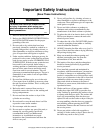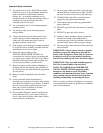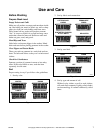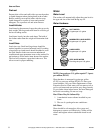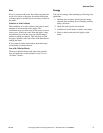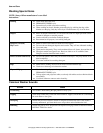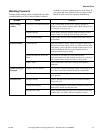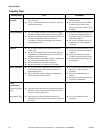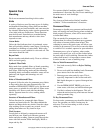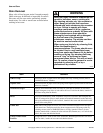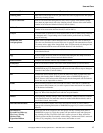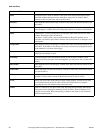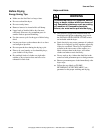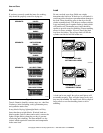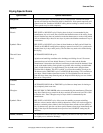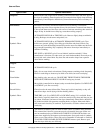
© Copyright, Alliance Laundry Systems LLC – DO NOT COPY or TRANSMIT
Use and Care
13
801506
Special Care
Starching
We do not recommend starching in this washer.
Knits
A variety of knits are used for many types of clothing
and household furnishings. Many knits are machine
washable, some are hand washable, and some must be
dry-cleaned. When buying, make sure the garment has
a care label with care instructions. These directions
must be followed. Some knits are stretched during
their manufacture and may shrink or relax when
exposed to water.
Cotton Knits
Unless the label indicates that it is preshrunk, cotton
knits will probably shrink to some degree. Overdrying
contributes to shrinkage of cotton knits. Wash water
should be hot or warm, suitable for color and soil. The
rinse water should be cold.
Rayon Knits
Rayon stretches and shrinks easily. Treat as a delicate
fabric and wash gently.
Synthetic Fiber Knits
Knits made from synthetic fibers or blends containing
a high percentage of synthetics will generally keep
their shape. When buying, make sure the trimmings
(including belts) are machine washable, seams are not
puckered, and zippers and trimmings are well
fastened.
Knits of Manufactured Fibers
In general, follow the rules for permanent press fabrics
as they tend to have the same characteristics. Set
machine to PERMANENT PRESS cycle. Set the wash
water warm, or suitable for color and soil. Rinse water
should be cold. Do not wash with lint-shedding
fabrics. Separate items for color, washing whites
separately.
Sweaters of Manufactured Fibers
Follow directions for comparable knits. Button
sweaters and turn inside out. The ribbon behind the
buttons and button holes may shrink. Stretch to shape
after washing. Orlon sweaters may stretch. Avoid
pulling them when wet. Dry items in dryer.
Wool Sweaters
Loosely knit or delicately constructed sweaters will
need delicate care. Hand wash. Measure garment
before and after washing. Squeeze gently through the
water with little motion. Rinse thoroughly. Block to
shape and dry flat.
For sweaters labeled “machine washable,” follow
manufacturer’s directions. Dry flat. Excess tumbling is
the main cause of wool shrinkage.
Wool Knits
Dry-clean wool knits unless labeled “machine
washable.” Follow manufacturer’s directions.
Permanent Press
Permanent or durable press garments and household
items will usually not need pressing when washed and
dried properly. However, some will be more wrinkle
resistant than others.
The care needed for permanent press is a little
different than for cottons. Permanent press garments
will soften or become pliable when heated. This
softening in warm or hot wash water will allow wear
wrinkles to be removed. This will also cause the fabric
to wrinkle if it is crushed, squeezed or spun when hot.
Permanent press cycles of washers, when washer
controls are properly set, will cool the clothes before
the wash spin to avoid wrinkling. Because the clothes
soften when heated, it is important to remove them
from the washer as soon as tumbling stops.
How to Wash Permanent Press
1. Sort loads correctly. Refer to Before Washing
section.
2. Do not wash with lint-shedding loads. Permanent
press attracts lint in the wash water.
3. Pretreat grease stains and oily areas. This is
especially important for shirt collars and cuffs.
Rub liquid detergent or a paste of detergent into
the area.
4. Use the PERMANENT PRESS cycle, hot or
warm water, cold rinse, and sufficient detergent.
5. Use fabric softener in the dispenser. This will
reduce the static electricity which attracts lint and
makes garments cling.
To Dry Permanent Press
For best results, permanent press should be dried in the
dryer. See garment care labels. Ironing may be
necessary. Use low heat setting on iron or steam
setting on a steam iron.



